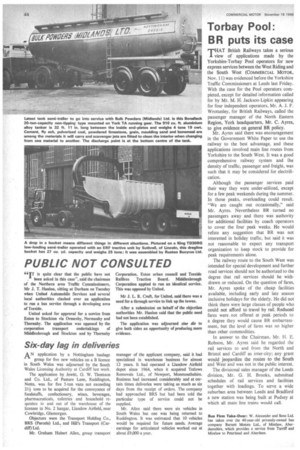Torbay Pool: BR puts its case
Page 46

If you've noticed an error in this article please click here to report it so we can fix it.
THAT British Railways takes a serious view of applications made by the Yorkshire-Torbay Pool operators for new express services between the West Riding and the South West (COMMERCIAL MOTOR, Nov. 1 I) was evidenced before the Yorkshire Traffic Commissioners at Leeds last Friday. With the case for the Pool operators completed, except for detailed information called for by Mr. M. H. Jackson-Lipkin appearing for four independent operators, Mr. A. J. F. Wrottesley, for British Railways, called the passenger manager of the North Eastern Region, York headquarters, Mr. C. Ayres, to give evidence on general BR policy.
Mr. Ayres said there was encouragement in the Government White Paper to use the railway to the best advantage, and these applications involved main line routes from Yorkshire to the South West. It was a good comprehensive railway system and he density of traffic, passenger and freight, was such that it may be considered for electrification.
Although the passenger services paid their way they were under-utilized, except for a few peak weekends during the summer. In those peaks, overloading could result. "We are caught out occasionally," said Mr. Ayres. Nevertheless BR turned no passengers away and there was authority for additional facilities by coach operators to cover the four peak weeks. He would refute any suggestion that BR was not interested in holiday traffic, but said it was not reasonable to expect any transport organization to keep stock to provide for peak requirements alone.
The railway route to the South West was intended for special development and further road services should not be authorized to the degree that rail services should be withdrawn or reduced. On the question of fares, Mr. Ayres spoke of the cheap facilities available, including early and late season inclusive holidays for the elderly. He did not think there were large classes of people who could not afford to travel by rail. Reduced fares were not offered at peak periods to a degree they would cause BR embarrassment, but the level of fares was no higher than other commodities.
In answer to the Chairman, Mr. H. E. Robson, Mr. Ayres said he regarded the rail services to and from the North and Bristol and Cardiff as inter-city; any grant would jeopardize the routes to the South and West and was not in the public interest.
The divisional sales manager of the Leeds division, Mr. G. H. Brooks, submitted schedules of rail services and facilities together with loadings. To serve a wide suburban area between Leeds and Bradford a new station was being built at Pudsey at which all main line trains would call.




































































































































